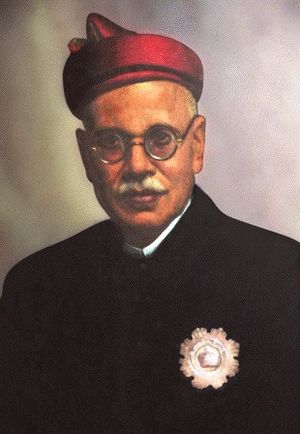Pandurang Vaman Kane
Lua error in package.lua at line 80: module 'strict' not found.
| Pandurang Vaman Kane | |
|---|---|
 |
|
| Born | May 7, 1880 Ratnagiri district, Maharashtra |
| Died | Script error: The function "death_date_and_age" does not exist.[1] |
| Awards | Bharat Ratna (1963) |
Dr. Pandurang Vaman Kane (pronounced Kaa-nay) (7 May 1880– 8 May 1972) was a notable Indologist and Sanskrit scholar. He received India's highest civilian award Bharat Ratna in 1963 for his scholarly work that spanned more than 40 years of active academic research that resulted in 6,500 pages of History of Dharmaśāstra. The historian Ram Sharan Sharma says: "Pandurang Vaman Kane, a great Sanskritist wedded to social reform, continued the earlier tradition of scholarship. His monumental work entitled the "History of the Dharmasastra", published in five volumes in the twentieth century, is an encyclopaedia of ancient social laws and customs. This enables us to study the social processes in ancient India."[2]
Contents
Famous works
Dr. Kane is famous for his magnum opus in English, History of Dharmaśāstra, subtitled Ancient and Mediaeval Religions and Civil Law in India. This work researched the evolution of code of conduct in ancient and mediaeval India by looking into several texts and manuscripts compiled over the centuries. It was published in five volumes; the 1st volume was published in 1930 and the last, in 1962. It runs to a total of more than 6,500 pages. Dr. Kane used the resources available at prestigious institutes such as the Asiatic Society of Mumbai and Bhandarkar Oriental Research Institute, among others. The work is known for its expanse and depth – ranging across diverse subjects such as the Mahabharata, the Puranas and Chanakya – including references to previously obscure sources. The richness in the work is attributed to his in-depth knowledge of Sanskrit. His success is believed to be an outcome of his objective study of the texts instead of deifying them.
Kane wrote the book Vyavaharamayukha and was in the process of writing an introductory passage on the History of Dharmaśāstra for this book so that the reader would get an overall idea apart from the subject of the book. One thing led to another and this project snowballed into the major work that it is. All the same, he was categorical in saying that it is difficult to find an English equivalent of the word "Dharma." His output in the form of writings across the three languages of English, Sanskrit and Marathi spans nearly 15,000 pages.
Recognition
Dr. Kane was rewarded as Mahamahopadhyaya (Etymology: Maha+Maha+Upadhyay = The greatest among the great teachers), usually shortened to MM as a prefix in the writings that refer to him. He served as the vice-chancellor of the University of Mumbai. His services were requisitioned and enlisted for establishing Kurukshetra University in Indic studies. He was awarded the Sahitya Akademi award in 1956 for History of Dharmaśāstra, vol. IV for his research under the Sanskrit translation category. He was also an honorary member of the Bharatiya Vidya Bhavan.
He was nominated to the Rajya Sabha as a member of Parliament for his distinguished record in the field of academics. The highest accolade bestowed upon him was the Bharat Ratna in 1963.
Indian law
Kane believed that the constitution of India made a complete break with the traditional ideas prevalent in India by engendering a false notion among the people that they have rights but no obligations.
Given the encyclopaedic and authoritative nature of his work, it is often used in debates in Polity. One such issue that cropped up during Atal Bihari Vajpayee government was whether ancient Indians ate beef and both the groups quoted extensively from Kane's work to support their viewpoint. This issue became important as Hindus traditionally revere the cow as a mother and hence eating of beef is prohibited. Another such issue was whether the girls in the ancient times had the right to wear the yajnopavita (sacred thread), as the upanayana ceremony was restricted only to the men in the recent past.
Legacy
To commemorate him, the Asiatic Society of Mumbai has established the Mm. Dr. P.V. Kane Institute for Post Graduate studies and Research in 1974 to promote, encourage and facilitate research in oriental studies. Also, MM Dr. P.V. Kane Gold Medal is given once every three years to a scholar for outstanding contribution to the study of Vedic, Dharmashastra or Alankara Literature.
See also
Dharmasastra and Dharma
Other sources
- S.G. Moghe (editor), Professor Kane's contribution to Dharmasastra literature, 1997, New Delhi: D.K. Printworld (P) Ltd. ISBN 81-246-0075-9
- Autobiographical Epilogue in History of Dharmashastra Vol 5
External links
- Rare letters and correspondences of P.V. Kane
- A write-up on MM Dr. P.V. Kane
- Publication dates of volumes[dead link]
- Sahitya Akademi Award[dead link]
- Honorary member of Bharatiya Vidya Bhavan
- Evolution of MM Dr. P.V. Kane’s Magnum Opus
- Constitution making a complete break with traditional ideas of India
- Biography (Chapter 2.2) (German site, biography in English)
- Kane's chronology of Dharmasastra literature (At the bottom of the article) (German site, chronology in English)
- P V Kane - Notes for the biography - Padmakar Dadegaonkar
References
Lua error in package.lua at line 80: module 'strict' not found.
- EngvarB from August 2014
- Use dmy dates from August 2014
- Articles with hCards
- Articles with dead external links from January 2013
- 1880 births
- 1972 deaths
- Recipients of the Sahitya Akademi Award in Sanskrit
- Recipients of the Bharat Ratna
- Marathi-language writers
- Indian Indologists
- Hindu historians
- People from Maharashtra
- University of Mumbai alumni
- Sanskrit scholars
- People from Ratnagiri district
- Marathi people
- Nominated members of the Rajya Sabha

